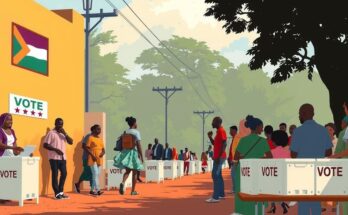President Daniel Chapo of Mozambique announced the involvement of three civil society figures in discussions on state reforms as part of a political agreement. This initiative aims to foster civic engagement and create structured working groups. The country is currently facing social unrest stemming from dissatisfaction with election results and rising living costs, resulting in significant violence and casualties.
On March 5th, President Daniel Chapo of Mozambique announced the inclusion of three esteemed civil society representatives in discussions related to state reforms, as part of a newly agreed political framework. He stated, “The document itself [the political agreement] states the need to have three civil society figures who we believe will need to draw up terms of reference for the inclusion of these figures of recognized merit.” This initiative is aimed at enhancing civic engagement in governmental reforms.
During an ensuing meeting with the signatories of the political agreement, President Chapo confirmed the establishment of a technical committee and various working groups. He explained that these bodies will incorporate diverse professional and social classes, ultimately culminating in a public discussion phase. The President reiterated the importance of creating a comprehensive action plan for the agreement’s execution and the integration of the chosen civil society figures.
The political agreement involved partnerships with parliamentary parties, including the Front for the Liberation of Mozambique (Frelimo), and non-parliamentary entities such as New Democracy (ND) and others. Meanwhile, Mozambique is grappling with social unrest marked by ongoing protests against rising living costs and contentious election results from October 9, which favored President Chapo. At least 353 lives have been lost, alongside significant property damage, during unrest since October 2022.
The recent announcement by President Daniel Chapo highlights a critical effort to involve civil society in the political reform process in Mozambique. This initiative aims to bolster public participation, address social grievances, and establish a structured approach to state reforms amidst ongoing social unrest and dissatisfaction regarding living conditions and political outcomes. The engagement of various stakeholders underscores a commitment to collective action and dialogue within the Mozambican political landscape.
Original Source: clubofmozambique.com




